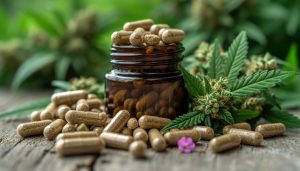The consumption of cannabidiol (CBD) products is constantly increasing, particularly for its relaxing and soothing effects. However, some people wonder about the potential consequences of such use, particularly with regard to drug testing. Do I test positive if I smoke CBD? In this article, we answer this question by exploring the different aspects of drug testing, the presence of tetrahydrocannabinol (THC) in CBD products, and the implications for users.
Sommaire
ToggleCannabis screening tests: how does it work?
To detect cannabis consumption, several types of tests exist, the most commonly used of which are the saliva test and the urine test. Other methods include blood and hair tests, but they are less common due to their high cost and complexity.
The saliva test
This test consists of taking a saliva sample using a stick or a specific device, then analyzing this sample to detect the presence of THC or its metabolites. The detection threshold is generally set at 25 ng/ml of THC in saliva. If the test is positive, confirmation by laboratory analysis can be carried out.
The urine test
Another popular means of screening is the urine test, which works similarly to the saliva test but using a urine sample. This method mainly detects the presence of THC-COOH, a metabolite of THC, with a threshold commonly set at 50 ng/ml. Results can also be confirmed by laboratory analysis if necessary.
CBD and its relationship with THC
It is important to remember that CBD is one of the many active substances contained in cannabis, but it is not what causes the psychoactive effects characteristic of the “high”. These effects are due to THC, another active substance. CBD-based products therefore aim to offer therapeutic benefits without reproducing these undesirable effects.
Legislation on THC content
According to the regulations in force in many countries, including France, the THC content of CBD-based products must not exceed a certain level (generally 0.2% or 0.3% by weight). This threshold ensures that this tiny amount of THC cannot cause a psychoactive effect in consumers. However, this does not necessarily mean that a CBD product is completely free of traces of THC.
Can you test positive on a drug test after smoking CBD?
The answer to this question depends on several factors, including the type of product consumed and the sensitivity of the tests used. Here are some things to consider:
- Not all CBD products are created equal: The quality and composition of the products may vary significantly from one manufacturer or brand to another. Certain oils, flowers, or e-liquids could contain traces of THC greater than those authorized by law.
- The duration between consumption and test: THC metabolites persist in the body for a certain period of time, which varies between individuals and consumption habits. The longer the time between taking CBD and taking the test, the less likely it is that a test will be positive due to residual traces of THC.
- The detection threshold of the tests: As mentioned previously, each test has a specific detection threshold. If this threshold is particularly low, it is possible that a test will detect the presence of THC even if it is very weak.
Some recommendations to reduce risks
To limit the chances of testing positive in a screening test after consuming CBD, here are some tips:
- Choose quality products, from manufacturers or brands that are reputable and transparent about their production and extraction methods.
- Remain vigilant regarding the composition of products, favoring those whose THC content is lower than legal limits.
- Find out about the specificities of the screening tests used in your professional or personal setting, to better understand their detection thresholds and their sensitivity.
In summary, although CBD products are legal and do not contain psychoactive concentrations of THC, there is a non-zero risk of testing positive on a cannabis drug test after consuming them. However, this risk can be minimized by being careful when choosing products and staying informed about the characteristics of the tests used.



